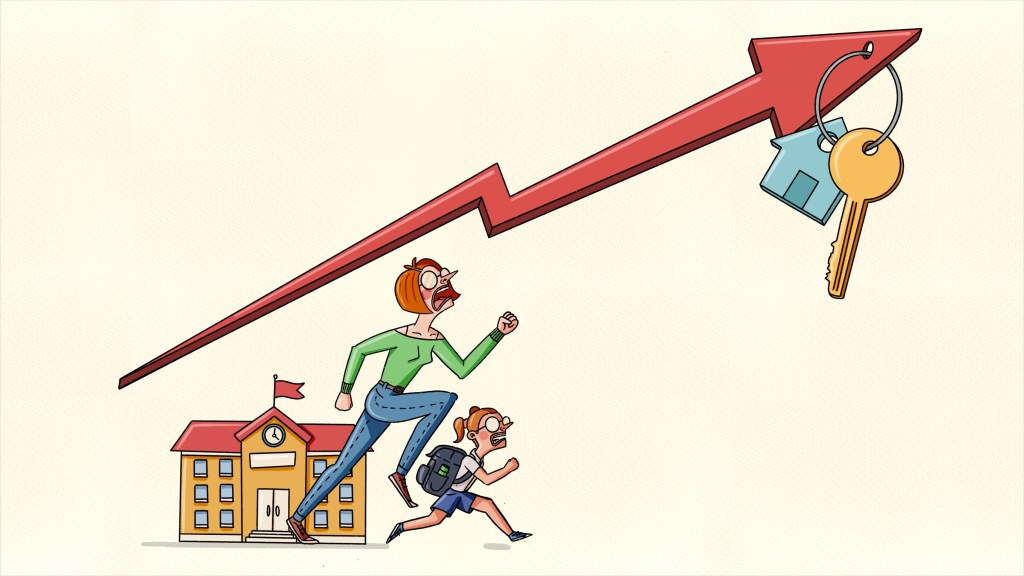Impact of VAT on School Fees Leading to Mortgage Challenges
Megan Bartlett, a successful entrepreneur in the adult care sector, earns an impressive £150,000 annually. However, despite her substantial income, securing a mortgage has become increasingly difficult for her.
While she anticipated challenges due to her self-employed status, the financial burden of paying £19,300 annually for her daughter Fiona’s private schooling has significantly impacted her borrowing potential. The recent increase in school fees has added to her frustrations.
“Before enrolling Fiona in private school in September 2023, I was offered a mortgage of £540,000, but I could not proceed due to a lack of adequate savings for a deposit,” explained Bartlett, a pseudonym used for privacy reasons.
“Now that I’ve managed to save enough, that offer has diminished to £111,000, largely because of the school fees.”
Bartlett intends to relocate to Welwyn, Hertfordshire, where the typical house price exceeds £691,000, according to Rightmove. Fiona’s school fees have recently increased by £2,100 annually, following the removal of VAT exemption for private schools.
“It feels very unjust,” she remarked. “As a self-employed individual, obtaining a mortgage is already challenging, but the additional school fees and upcoming VAT payment in January make it nearly impossible.”
Experts indicate that parents are in for an unpleasant surprise with the new 20% VAT on school fees.
According to Andrew King at Evelyn Partners, “Parents might not realize that lenders factor in all school-related expenditures, and they may face a mortgage shock. With the VAT added, the amount they can borrow will simply be lower.”
Here’s a breakdown of the situation.
Fee Increases
The average fees for day schools stand at £6,021 per term (£18,063 annually), while boarding school fees average at £14,153 per term (£42,459 yearly), as reported by the Independent Schools Council.
Should the full 20% VAT be imposed, costs for day pupils would increase by £3,612 a year, reaching a total of £21,675. For boarders, fees would soar by £8,492, totaling £50,951.
Reduced Borrowing Capacity
The majority of banks typically lend up to five times a borrower’s income; however, substantial expenses like school fees will restrict how much can be borrowed.
For instance, a couple with an income of £80,000 each, who are also paying £18,063 in school fees, could expect to borrow £502,000 over 20 years at a fixed 4.75% interest rate, as per Evelyn Partners. This calculation includes a combined £1,200 monthly expenditure on essentials such as bills, travel, and groceries.
With an added £3,612 annually for VAT on school fees, their borrowing capacity could drop by £36,000 to £466,000. Without school fee payments, their borrowing potential would reach £681,000.
Parents who were already facing challenges with fees prior to the VAT increase may struggle to remortgage, noted King. “Lenders may not approve them given these heightened school fee costs, particularly if they are transitioning from a long-term fixed-rate mortgage to one with higher payments due to recent interest rate hikes.”
Adrian Anderson from Anderson Harris, a mortgage brokerage, highlighted that many families might find it unfeasible to relocate. “Rising school fees could prevent families from purchasing the homes they desire,” he explained. “This situation could mean missing out on larger homes or additional rooms, hindering their ability to move up the property ladder.”
Adjusting Mortgage Strategies
Some parents may need to reevaluate their mortgage agreements in light of the VAT burden.
Anderson anticipates an increasing number of families opting for interest-only mortgages to accommodate these costs. In such arrangements, monthly payments address only the interest without reducing the principal amount borrowed.
Currently, the average fixed-rate for two years is 5.48%. A monthly payment on a £200,000 mortgage over 25 years would typically be £1,226, but on an interest-only basis, this would decrease to £913.
“This type of mortgage carries risks,” Anderson cautioned. “Your payments will solely cover interest, making it critical to manage repayments or risk higher debts later on.”
Ian Cook, who shifted to an interest-only mortgage last June, noted that this adjustment lowered his monthly payments by £800. This was necessary to cover the VAT for his son Gabriel’s school fees, which have increased by £3,500 to £26,660 annually. He has also cut back on his pension contributions by £300 a month to manage the fee hikes.
“I don’t have substantial savings or benefactors to help with these costs, so my adjustments are quite significant,” Cook shared.
He observed an uptick in families facing similar financial adjustments and sacrifices for education costs, noting that one client in his advisory role halted a £1,250 monthly pension contribution to prioritize saving for school fees and VAT increases.

Strategies for Parents
There are strategies to alleviate the financial strain that higher school fees could impose on borrowing capacity.
“Some lenders may not consider school fees as a outgoing if you have equivalent savings and investments,” Anderson explained. “One client projected to spend £500,000 on their children’s education leveraged their £500,000 in investments to buffer against school fee impacts, ultimately securing a £1.5 million mortgage offer, dramatically improved from previous assessments.”
For those lacking extensive savings, reducing other expenditures could be a viable solution, suggested King. “Returning to budgeting fundamentals—like cancelling gym memberships, eliminating unused subscriptions, and switching to cost-effective phone plans—could help minimize spending and increase borrowing potential,” he advised.




Post Comment